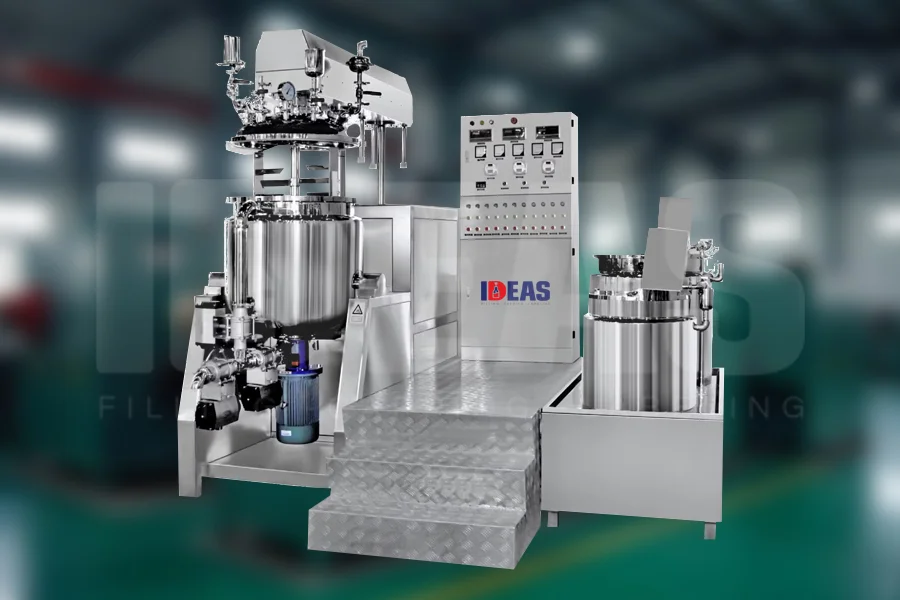Emulsifying Machine Company in Dubai
Emulsifying Machine Company in Dubai, UAE
Ideas Packaging Machinery is a trusted emulsifying machine company in Dubai, offering a wide range of solutions for diverse industries. Our advanced machines include Batch Emulsifiers, Continuous Emulsifiers, High-Shear Homogenizers, and Vacuum Emulsifiers, ensuring precise and efficient mixing for various applications. We also specialize in Colloid Mills, Ultrasonic Emulsifiers, Planetary Emulsifiers, and Inline Emulsifiers, designed for optimal performance and reliability.
Whether for laboratory or industrial use, our equipment, such as Pressure Homogenizers, Microfluidizers, and Double-Stage Emulsifiers, delivers exceptional results. Committed to quality and innovation, we provide tailored solutions and expert support to help businesses streamline their production processes effectively.

8 important elements to evaluate when choosing the perfect emulsifying machine for your business needs?
When selecting the ideal emulsifying machine for your business, consider factors like efficiency, durability, size, ease of maintenance, cost, speed, customization, and energy consumption to optimize production and improve product quality.
Quality & Durability
Quality enhances performance, ensuring optimal results, while durability guarantees long-lasting reliability.
Technology & Innovation
Technology and innovation drive progress by creating new solutions and enhancing existing systems.
Solutions & Flexibility
Solutions and flexibility help businesses quickly adapt to changing needs continued growth and success.
Efficiency & Speed
Efficiency and speed allow businesses to optimize operations, minimize waste, and deliver faster outcomes.
Design & Maintenance
Design and maintenance ensure products are both aesthetically pleasing and dependable in performance.
After-Sales Support
After-sales support assists customers post-purchase, ensuring satisfaction and addressing any concerns.
Safety & Standards
Safety and standards ensure products and services meet essential quality and regulatory requirements
Competitive Pricing
Competitive pricing offers exceptional value, aligns with market trends, and effectively attracts customers
Frequently Asked Questions (FAQ)
Emulsifying machines use high-speed mixing to combine liquids like oil and water into stable emulsions. They are crucial for producing uniform products in food, cosmetics, and pharmaceutical industries.
What is an emulsifying machine?
An emulsifying machine is a device designed to blend two or more immiscible liquids, such as oil and water, into a stable emulsion. It is commonly used in food, cosmetics, and pharmaceutical industries.
How does an emulsifying machine work?
An emulsifying machine uses high-speed mixing, shear forces, and sometimes heat to break down the particles of one liquid and disperse them evenly throughout the other. This process creates a uniform, stable emulsion.
What industries use emulsifying machines?
Emulsifying machines are widely used in the food and beverage industry (e.g., mayonnaise, sauces, and dressings), cosmetics (e.g., creams and lotions), pharmaceuticals (e.g., ointments), and chemicals (e.g., paints and coatings)
What are the types of emulsifying machines?
There are several types of emulsifying machines, including high-shear mixers, rotor-stator mixers, and ultrasonic emulsifiers, each suited for different types of emulsions and production volumes.
What is the difference between an emulsifier and an emulsifying machine?
An emulsifier is a substance that helps two liquids combine and remain stable. At the same time, an emulsifying machine is the equipment used to blend and mix the liquids to create a physical emulsion.
What materials can be emulsified using an emulsifying machine?
Emulsifying machines can handle a wide variety of materials, including oils, water, surfactants, powders, and other ingredients used in food, cosmetics, pharmaceuticals, and chemical formulations.
How do I choose the right emulsifying machine for my needs?
The choice depends on factors such as the volume of production, materials viscosity, desired emulsion stability, and specific industry requirements. Consulting with an expert or supplier can help determine the best machine for your application.
What are the benefits of using an emulsifying machine?
Emulsifying machines offer precise control over the emulsion process, resulting in better product consistency, improved texture, increased shelf life, and higher-quality emulsions.
Can an emulsifying machine handle high-viscosity materials?
emulsifying machines can handle high-viscosity materials, especially with the use of specific high-shear or rotor-stator systems designed to effectively break down thicker substances.
How do I maintain an emulsifying machine?
Regular maintenance includes cleaning the machine after each use, inspecting seals and gaskets, lubricating moving parts, and ensuring that all components are functioning correctly to maintain the machine’s performance and extend its lifespan.
